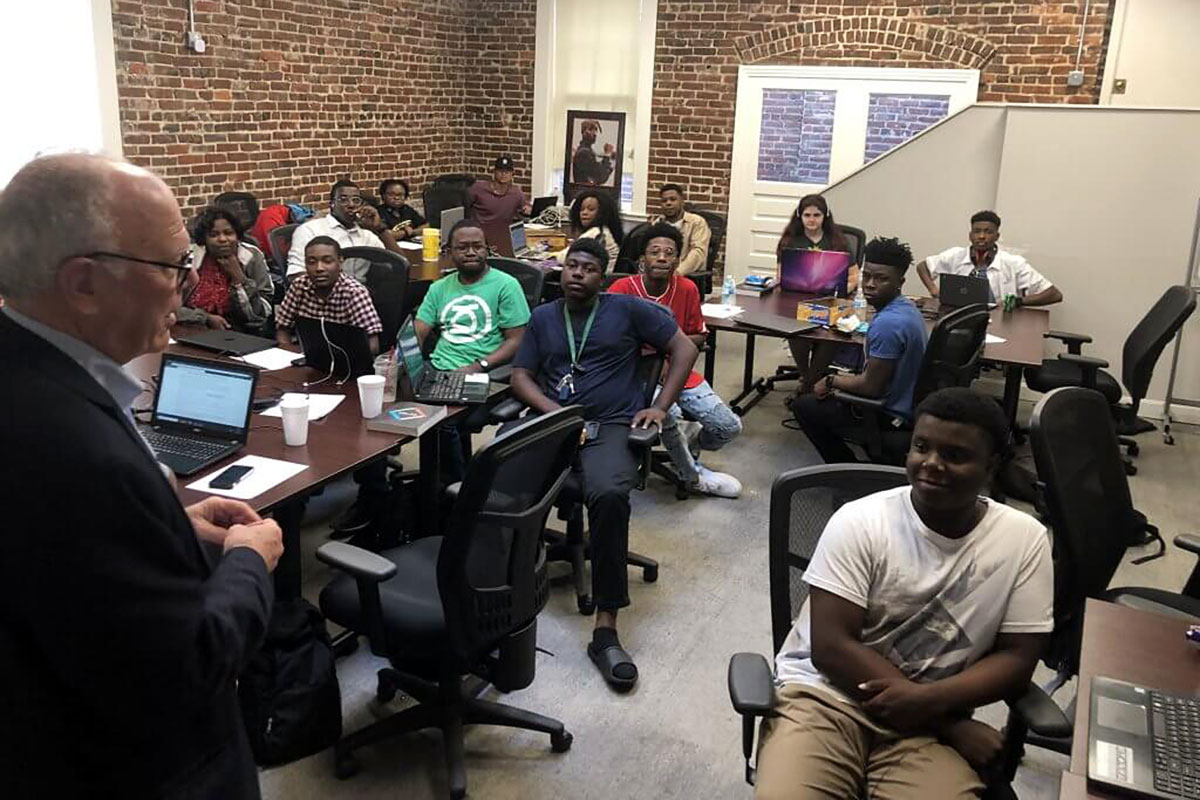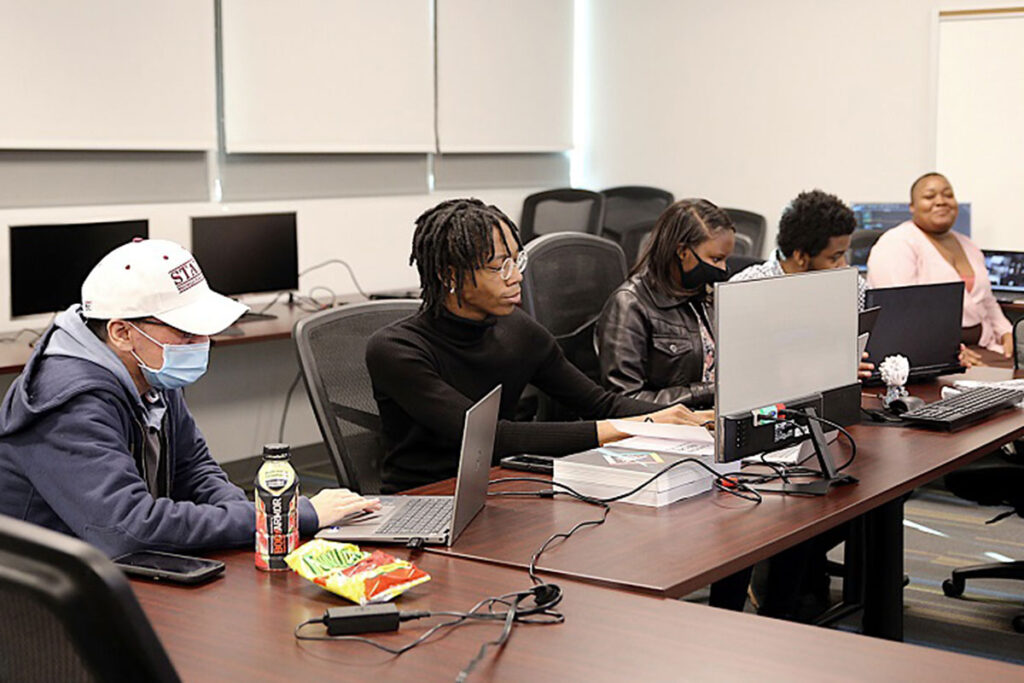A new Mississippi technology organization is using a $250,000 grant as part of its efforts to reduce inequities in artificial intelligence. The Mississippi AI Collaborative’s leaders believe AI can be a “democratizing” force that could help bridge economic and technology gaps in the poorest state in the country.
“We had the idea of AI Collaborative before the grant. We were trying to figure out, for the programming that we wanted to do, how we were going to fund it,” Mississippi Computer Science Teacher Association Krystal Chapman told the Mississippi Free Press. ”So (the grant) is helping with the pilot for the AI Collaborative.”
The Mississippi AI Collaborative is one of five recipients of the Generative AI Skills Challenge grant. The awardees were selected from nearly 600 applications across 93 countries. The group is the only one in the country to receive the grant. Data.org and Microsoft provide funding and technical assistance to awardees.
The group that formed the collaborative earlier this year includes Chapman, Jackson State University Assistant Professor of Art History Brittany Myburgh, Mississippi Coding Academies Executive Director Bob Buseck, Microsoft TechSpark leader JJ Townsend, BeanPath creator Nashlie Sephus and BeanPath STEAM Programming Director Anik Kurjian. The group says they are focused on ensuring equitable access to AI education, skills and resources for Mississippians. Their grant proposal was a multipart project spanning from K-12 education to small business assistance.
“We had all been collaborating on things like access to STEM education, computer science,” Myburgh told the Mississippi Free Press. “With the development of generative AI, we realized that what was needed to reach as many people with the work that we were already doing was this kind of collaborative approach. So we decided to formally come together to write the big generative AI grant.”
A considerable proportion of the population in Mississippi comes from underrepresented communities. The State Digital Equity Scorecard, a website created by the National Digital Inclusion Alliance, gave Mississippi 1.5 out of a possible 6 points during its last ranking in 2021.

The state has been making efforts to improve digital access and literacy by increasing broadband access to rural areas and working to improve technology access in public schools. While AI has come under fire nationally over concerns about intellectual property theft and racial or gender bias, the collaborative’s members that AI can also help the state bridge the digital divide. They plan to examine questions of equity and who has access across the state.
“We all really felt that there was a sense of urgency to the work that we were doing because generative AI could be this force that is very democratizing, but only if everyone has access to it,” Myburgh said. “So it’s really that question of access both to the technology and to the resources to be able to use it.”
Myburgh also said that it is important to teach residents about biases that are present in AI. Generative AI learns from real-world data, including text and images from the internet that mimic systemic, racial and gender bias. Discriminatory data and algorithms can be embedded into AI models producing results that reflect and perpetuate human biases in society. Because of this, users must learn to identify and address them.
“Generative AI is a reflection of us and our society so (it) will produce and reinforce biases,” Myburgh said. “So when we’re talking about equity from that standpoint, we need to interrogate the kinds of models that we’re using … and how can we give everyone in the state of Mississippi the tools to be able to think critically about using AI in a way that’s responsible and ethical.”

The grant will allow the collaborative to begin or expand several programs. The AI Learning Accelerator for Educators will focus on ensuring educators have the knowledge and tools necessary for teaching AI. The initiative, driven by the Mississippi Chapter of the Computer Science Teacher Association, will offer comprehensive training and resources to educators, making AI concepts more accessible for students. Selected educators will take part in a six-month fellowship aimed at teaching, training, and advocating for equitable AI educational practices.
“They will learn about equitable AI instructional practices so that they can develop a workshop to share with their colleagues,” Chapman said. “They will be able to provide that workshop training with the hopes of supporting their colleagues with integrating artificial intelligence and equitable practices in their learning spaces.”
The AI Agency, led by Bean Path, will assist small businesses and nonprofits in using AI to increase efficiency, assist with marketing and managing workflows. The agency will be run by Jackson State students who will gain practical experience while offering free technical assistance. They will also host in-person training for general AI knowledge and skills.
“Our students have already been getting very familiar with AI and how it can be embedded into business processes and workflows,” Mybugh said. “My graphic design students have also been using AI in their creative workflows to look at how they can better support businesses with everything from websites to marketing.”

Mississippi Coding Academies focus on bringing technology education to residents from underserved families. Most participants in the free program only have a high school diploma. The program has certified more than 250 software professionals. Through the grant, the academies will introduce a new AI curriculum. The program will focus on helping learners understand what artificial intelligence is, its ethical uses and then the future of workplace activities with the use of AI.
“We’re teaching a lot of thought processes and methodologies that are being created at the same time,” Buseck told the Mississippi Free Press.” It’s a real exciting momentum that’s moving in technology, but at the same time, it’s still in its infancy. So a lot of what we’re teaching is still being developed by major corporations like Microsoft, Amazon and Google.”
Buseck believes that the work of the AI collaborative can be pivotal for the Mississippi economy.
“All of those businesses that are looking for a workforce don’t really consider Mississippi to have technical readily available people. That’s going to change,” Buseck said. “With this AI collaborative, our goal is to enrich, upskill and educate over 6,000 Mississippians in a very short amount of time in an emerging technology that is dominating the workplace.”
For more information on the Mississippi AI Collaborative and the programs it offers, visit mississippiai.org.










